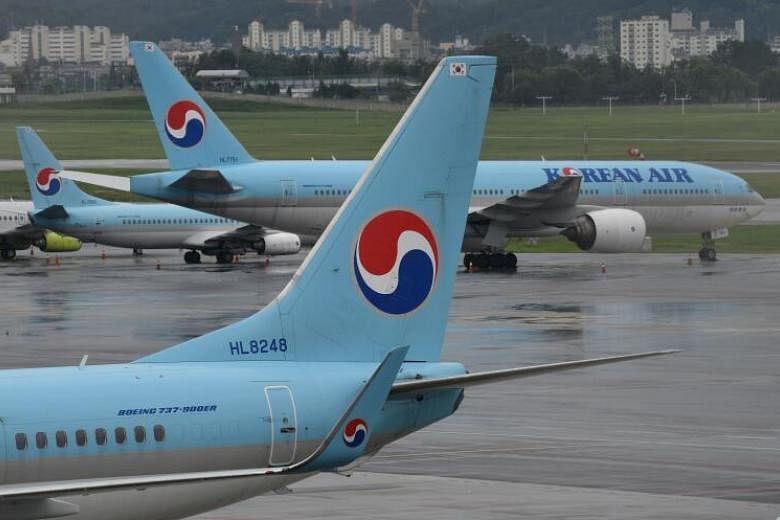SEOUL (THE KOREA HERALD/ASIA NEWS NETWORK) - China unilaterally cancelled two flights chartered by Samsung Electronics to send its employees to the country.
The flights were arranged under an agreement reached by South Korea and China in May to fast-track the entry of their peoples for business purposes. Beijing effectively flouted the agreement.
The planes were scheduled to depart for the Chinese cities of Xian and Tianjin on Nov 13. Samsung Electronics has memory chip manufacturing facilities in Xian and a TV factory in Tianjin.
Seoul speculates that the cancellation could be related to China's recent strengthening of entry restrictions.
China can cancel chartered flights out of concerns about the spread of Covid-19, but it could have given South Korea prior notice. Skipping this simple procedure reveals that China thinks little of South Korea, its government, and its people.
And yet, the Korean Foreign Ministry did not protest against the unannounced breach of the accord nor expressed regret.
Rather, the ministry highlighted that "with the recent increase in foreign Covid cases entering China, Beijing has implemented stronger quarantine measures for all of the entrants from abroad, regardless of nationality and whether the purpose of their visits is business or not." The ministry effectively speaks for Beijing.
In March, when Japan restricted the entry of Koreans as the pandemic peaked in South Korea, the ministry summoned Japanese Ambassador to Korea Koji Tomita immediately.
Foreign Minister Kang Kyung-wha strongly rebuked the Japanese government. She denounced Japan's entry restriction as "most deplorable," "unfriendly" and "unscientific."
This is contrasts sharply with its attitude toward China's sudden cancellation of Samsung-chartered flights.
Early this year when the novel coronavirus spread rampantly in Wuhan, China, most countries banned the entry of Chinese people.
In South Korea, medical experts and many people demanded on several occasions that the government take the same measure but the administration under President Moon Jae-in stubbornly refused to deny Chinese people entry to Korea.
Mr Moon told Chinese President Xi Jinping over the phone on Feb 20 that "China's difficulties are South Korea's difficulties."
In late February when Ms Kang made a comment in protest against the "excessive" forced quarantine of South Korean travellers in some Chinese cities, Beijing did not ask to be excused but asserted that disease prevention was more important than diplomacy.
Starting on Nov 11, China required all passengers arriving from South Korea, regardless of their nationalities, to submit two negative Covid-19 test results from two separate testing sites.
Before then, it had required South Korean travellers to China to submit one negative test result before boarding their flights.
The two tests must be completed within 48 hours before departure. They should be conducted at facilities designated by the Chinese Embassy in Seoul.
Test expenses estimated at 400,000 won ($485) are shouldered by those undergoing the tests.
On the other hand, Chinese people entering South Korea do not have to submit test results. And they take free Covid-19 tests after entering Korea.
Most countries follow the principle of reciprocity when it comes to costs of infectious disease testing and treatment for foreign entrants. But China has an asymmetric relationship with South Korea in light of Covid-19 prevention.
Nevertheless, the South Korean government effectively speaks in defence of China.
The Central Disaster and Safety Countermeasures Headquarters said that the "quarantine procedure of one country is an issue to be resolved after it considers the degree of risk of the other country and the economic and administrative conditions for disease prevention, rather than diplomatic reciprocity."
This reminds people of the Minister of Health and Welfare Park Neung-hoo, who blamed the epidemic on the Koreans. Regarding the calls for ban on the entry of Chinese people, Park said that "the biggest cause is Korean people coming from China."
In order to contain the virus and revive the global economy, reciprocity and mutual assistance among countries are more important than ever before.
China's arrogance toward South Korea is a problem, but as problematic is the submissive attitude of the Moon administration that does not say what it has to.
The Korea Herald is a member of The Straits Times media partner Asia News Network, an alliance of 24 news media organisations.

